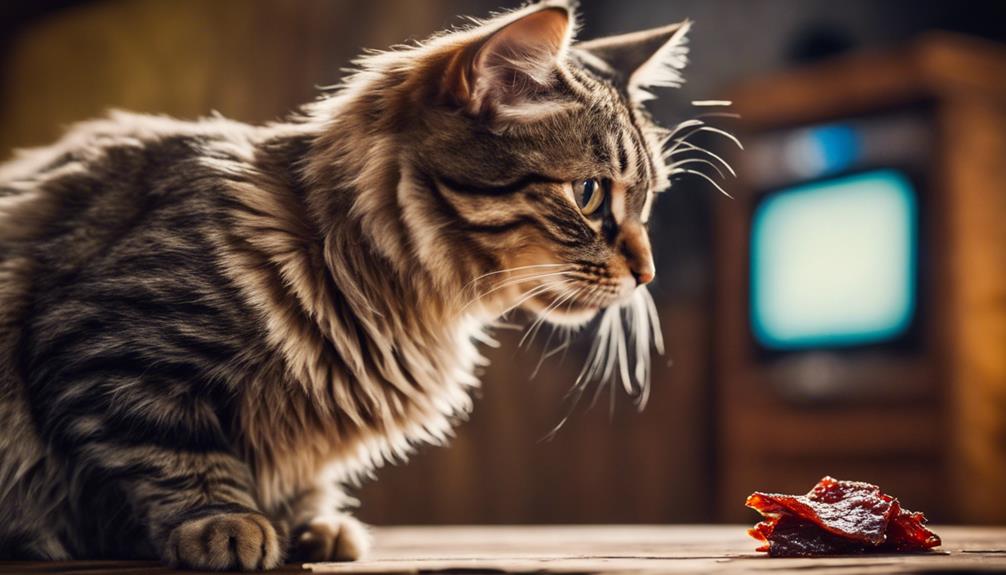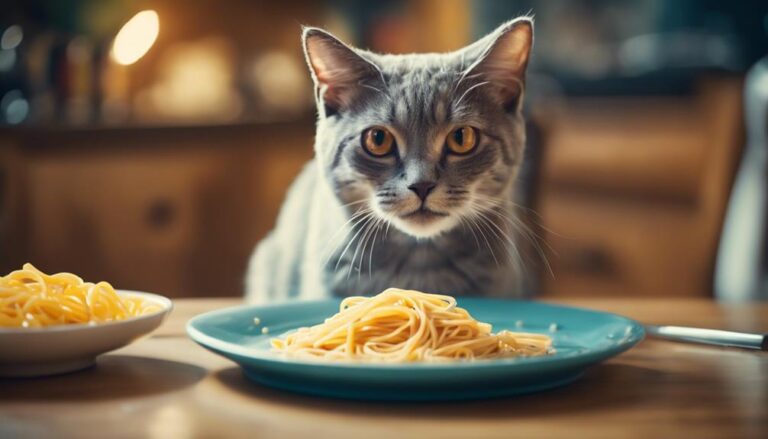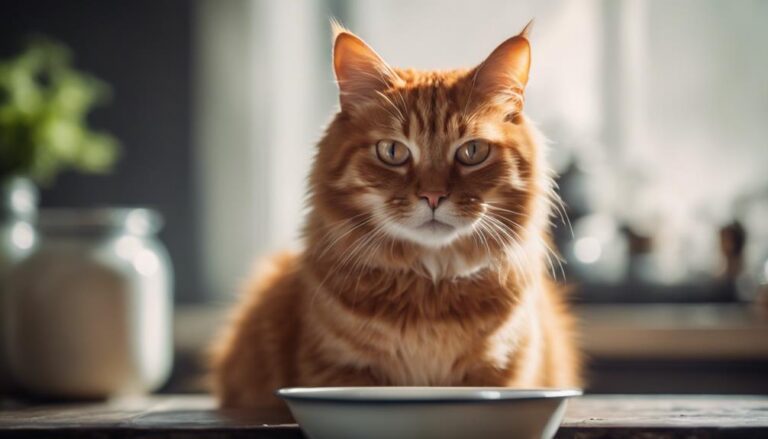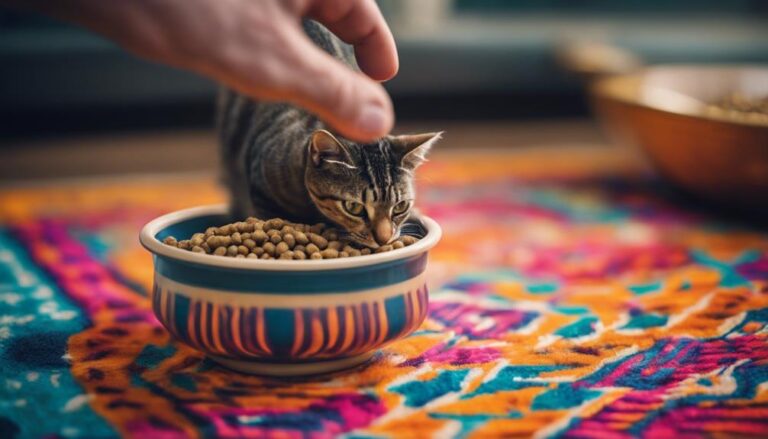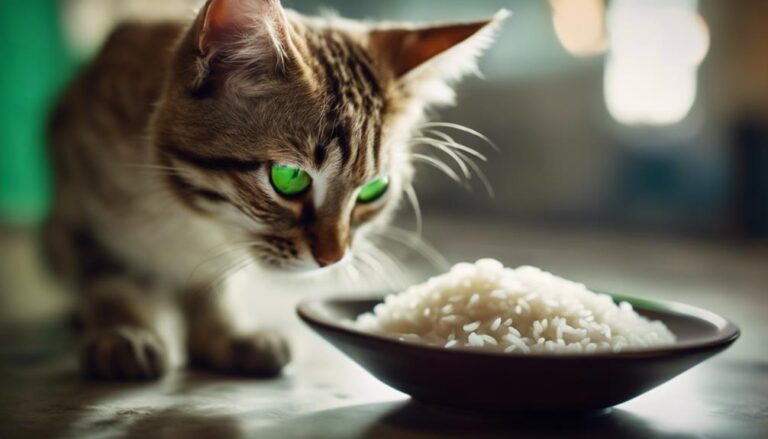If you've ever wondered about feeding your feline friend beef jerky, there are some crucial factors to consider. While the occasional nibble might seem harmless, the implications of this popular human snack on your cat's health are worth pondering. From potential choking hazards to toxic seasonings, the risks associated with sharing beef jerky with your cat might surprise you. Before you reach for that next piece, it's essential to understand the full scope of consequences for your furry companion.
Potential Choking Hazard
Beef jerky presents a potential choking hazard for cats due to its tough, dry texture. Cats may find it challenging to chew and swallow beef jerky, increasing the risk of choking incidents. The dehydration process that beef jerky undergoes contributes to its hard texture, making it difficult for cats to consume safely.
Unlike typical cat foods, the texture of beef jerky is significantly tougher, leading to potential choking risks for cats. Ingesting large pieces of beef jerky can result in fatal choking incidents in cats, emphasizing the importance of caution when feeding this treat to your feline friend.
To keep your cat safe, it's crucial to be mindful of the potential choking hazard that beef jerky presents. Always supervise your cat while they're eating and consider avoiding feeding them beef jerky altogether to prevent any choking incidents. Prioritizing your cat's safety by being cautious about the treats you offer can help ensure their well-being and enjoyment.
High Sodium Content
Considering the potential risks associated with beef jerky for cats, it's important to note that the high sodium content in this treat can have detrimental effects on your feline friend's health. Cats are sensitive to excessive sodium intake, and consuming beef jerky with high sodium levels can lead to dehydration, kidney damage, and other health issues.
The salt used in curing beef jerky can be harmful if ingested in large amounts by your cat. Excessive sodium intake from beef jerky can cause your cat to become excessively thirsty, potentially resulting in sodium poisoning. In severe cases, sodium poisoning can lead to permanent kidney damage in cats.
Therefore, it's crucial to monitor your cat's diet and avoid feeding them beef jerky or any other treats with high sodium content to prevent these serious health concerns. Keep your cat safe and healthy by opting for cat-friendly treats that are low in salt and sodium.
Toxic Seasonings
Avoiding toxic seasonings in beef jerky is crucial for ensuring the safety and well-being of your cat. Seasonings like garlic and onion powder can be harmful to cats, potentially leading to distress and health issues if consumed.
Some flavors of beef jerky may contain various sauces and seasonings that pose a risk to your feline friend. Before sharing any beef jerky with your cat, make sure to check the ingredients for any toxic seasonings that could potentially cause poisoning.
Cats should steer clear of beef jerky that contains these harmful additives to prevent any adverse effects on their health. Being cautious about the seasonings in beef jerky can help safeguard your cat from encountering any unnecessary risks or health complications.
Risks of Dehydration
Eating beef jerky can put your feline at risk of dehydration due to its high sodium content.
Watch for signs like excessive thirst, lethargy, and decreased appetite, which could indicate dehydration in your cat.
To prevent this, ensure your cat has access to fresh water and limit their intake of salty treats like beef jerky.
Dehydration in Cats
Dehydration in cats, especially from consuming high-sodium beef jerky, can pose serious risks to their kidney health. The high salt content in beef jerky can lead to dehydration, causing cats to experience excessive thirst and increasing the likelihood of kidney damage.
Sodium poisoning is a real concern, as it can result in dehydration and other health issues for cats. Regular consumption of beef jerky by cats can exacerbate dehydration risks due to the sodium content present in the treat.
It's crucial to monitor your cat's diet and ensure they have access to fresh water to prevent dehydration-related complications. Be mindful of the salt levels in any treats you offer your feline companion to safeguard their well-being.
Signs to Watch for
Watching for signs of dehydration in your cat after consuming beef jerky is crucial for their well-being and health. Keep an eye out for excessive thirst, reduced urination, lethargy, and weakness, as these could indicate dehydration.
Dehydration, especially from high-sodium beef jerky, can potentially lead to kidney damage in cats. Monitor your cat's water intake and urinary habits closely to detect any changes that may suggest dehydration.
If you suspect your cat is dehydrated after eating beef jerky, it's essential to seek a veterinarian's assessment promptly. A veterinarian can provide the necessary treatment to address dehydration and prevent further complications, ensuring your cat's health and recovery.
How to Prevent
To minimize the risk of dehydration in your cat, it's advisable to steer clear of feeding them beef jerky due to its high sodium content. Cats are sensitive to sodium consumption, and excessive intake, such as from beef jerky, can lead to dehydration and potential kidney damage.
If your cat ingests too much sodium from beef jerky, they may exhibit increased thirst as their body attempts to balance the sodium levels. In severe cases, sodium poisoning from beef jerky can result in permanent kidney damage, posing serious health risks to your feline companion.
Therefore, the best course of action to prevent these complications and maintain your cat's well-being is to avoid feeding them beef jerky altogether.
Health Implications
High sodium content in beef jerky poses health risks for cats, potentially leading to dehydration and kidney damage. Cats are particularly sensitive to high levels of sodium, which can disrupt their electrolyte balance and lead to serious health issues.
In addition to sodium, extra seasonings like garlic found in beef jerky can be toxic to cats, causing harm to their red blood cells and digestive system. Cats may also suffer from allergies to beef, experiencing symptoms such as itching, skin irritation, and hair loss.
Furthermore, silica gel packets often found in beef jerky packaging can be harmful if ingested by cats, potentially causing gastrointestinal blockages or poisoning. To safeguard your cat's health, it's crucial to avoid feeding them beef jerky and opt for safer treat alternatives that are specifically formulated for feline consumption.
Prioritizing your cat's well-being by steering clear of beef jerky can help prevent potential health risks and complications down the line.
Safer Treat Alternatives
For a safer alternative to beef jerky for your cat, consider dried fish or seafood treats with lower sodium content. These options provide nutritious treats that cater to your cat's dietary needs while promoting their well-being.
Dried fish or seafood treats are rich in Omega-3 and Omega-6 fatty acids, which can benefit your cat's joint health and coat condition. Additionally, cat-specific jerky treats, like Hare of the Dog Cat Hare 100% Rabbit Jerky, offer a safe snack option without harmful additives. Opting for specially formulated cat beef jerky snacks ensures that your feline friend's dietary requirements are met safely.
Frequently Asked Questions
What Happens if Cats Eat Beef Jerky?
If cats eat beef jerky, they might experience digestive issues like vomiting, diarrhea, and nausea. It's crucial to avoid feeding them this treat due to potential health risks. Contact a vet immediately for guidance.
Can My Cat Have Teriyaki Beef Jerky?
Avoid giving your cat teriyaki beef jerky as it can contain harmful ingredients like garlic and onion powder. Opt for cat-specific treats to keep your feline friend safe and healthy. Be mindful of their dietary needs.
Can Cats Have Slim Jims?
Avoid feeding your cat Slim Jims. These snacks contain high salt and preservatives, leading to dehydration and kidney damage. The additional seasonings like garlic and onion powder can be toxic. Protect your cat's health by avoiding Slim Jims.
Is It OK for Cats to Eat Beef?
Eating beef is okay for cats, but be cautious with beef jerky. While they might enjoy it, the high salt and additives can harm them. Consider safer options like dried fish or cat-specific treats.

